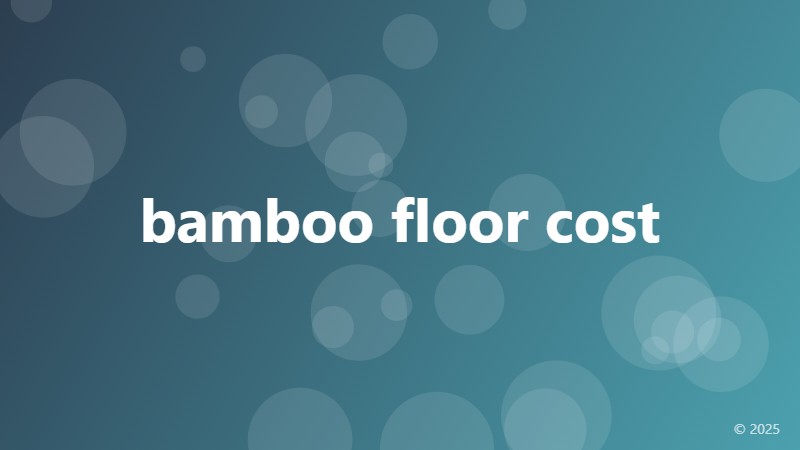bamboo floor cost

Understanding Bamboo Floor Cost: A Comprehensive Guide
When it comes to flooring options, bamboo is increasingly becoming a popular choice among homeowners. Not only is it eco-friendly, but it's also durable, resistant to scratches, and aesthetically pleasing. However, one of the most critical factors to consider when deciding on bamboo flooring is the cost. In this article, we'll delve into the world of bamboo floor cost, exploring the factors that affect pricing, the average cost of bamboo flooring, and tips on how to save money without compromising on quality.
Factors Affecting Bamboo Floor Cost
The cost of bamboo flooring can vary significantly depending on several factors. Here are some of the most critical factors to consider:
1. Quality of Bamboo: The quality of bamboo flooring can greatly impact the cost. High-quality bamboo flooring made from premium materials and manufactured using advanced techniques will naturally be more expensive than lower-quality options.
2. Thickness and Width: The thickness and width of the bamboo planks also play a significant role in determining the cost. Thicker and wider planks require more material and are therefore more expensive.
3. Finish and Treatment: The finish and treatment of the bamboo flooring can also affect the cost. Flooring with advanced finishes, such as hand-scraped or distressed, will be more expensive than those with a simple, natural finish.
4. Brand and Manufacturer: The brand and manufacturer of the bamboo flooring can also impact the cost. Reputable brands with a strong reputation for quality and durability may charge more for their products.
Average Cost of Bamboo Flooring
So, how much does bamboo flooring cost on average? The cost of bamboo flooring can range from $2 to $15 per square foot, depending on the factors mentioned above. Here are some approximate cost ranges for different types of bamboo flooring:
1. Engineered Bamboo Flooring: $2 to $5 per square foot
2. Solid Bamboo Flooring: $3 to $7 per square foot
3. Hand-Scraped Bamboo Flooring: $5 to $10 per square foot
4. Exotic Bamboo Flooring: $8 to $15 per square foot
Tips on Saving Money on Bamboo Flooring
While bamboo flooring can be a significant investment, there are ways to save money without compromising on quality. Here are some tips:
1. Buy in Bulk: Purchasing bamboo flooring in bulk can help reduce the cost per square foot.
2. Opt for Engineered Flooring: Engineered bamboo flooring is generally cheaper than solid bamboo flooring.
3. Consider Remnants: Consider purchasing remnants or leftover bamboo flooring from previous projects to save money.
4. DIY Installation: If you're comfortable with DIY projects, consider installing the bamboo flooring yourself to save on labor costs.
By understanding the factors that affect bamboo floor cost and following these tips, you can enjoy the benefits of bamboo flooring while staying within your budget. Remember to always prioritize quality and durability to ensure your bamboo flooring lasts for years to come.